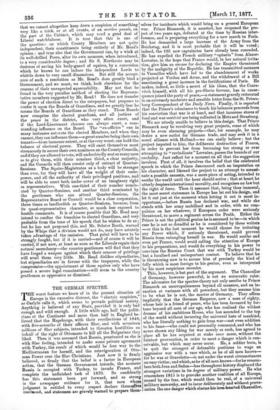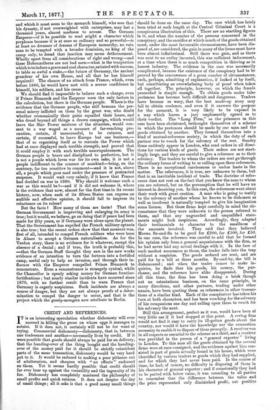liked. Then it 'VMS assumed that Russia, penetrated as she
is p once
with Slav feeling, intended to make some private agreement faintest provocation, in order to meet a danger which is con- with Turkey, the result of which would be free way to the ceivable, but which may never occur. He, a soldier born, is Mediterranean for herself, and the reinvigoration of Otto- to quit the strongest of defensible positions to wage an man Power over the Slav Christians. Just now it is firmly aggressive war with a race which, as he of all men knows— believed, so firmly that the belief is a factor in European for he was at Gravelotte—is not under the worst circumstances action, that the German Government intends, the moment an easy victim; and which, as he of all men knows—for he remem- Russia is occupied with Turkey, to invade France, , and bers both Jena and Sedan—has throughout history displayed the complete the unfinished task of 1870. So confidently strangest variations in its degree of military power. He who has this statement been put forward, and so strong remembers 1815 is to provoke another coalition of all Europe, is the newspaper evidence for it, that men roused by the fear, which would then be real, of a universal judgment is entitled to every respect declare themses military monarchy, and to incur deliberately and without provo- convinced, and statesmen are gravely warned to prepare them. cation the one danger which alarms his iron-hearted Ohancellor,
that we cannot altogether keep down a suspicion of something selves for incidents which would bring on a general European very like a trick, or at all events, of an arritlre pense'e, on war. Prince Bismarck, it is asserted, has reopened the pro-, the part of the Cabinet, which may need a good deal of ject of two years ago, defeated at the time by Russian inter- Liberal watchfulness. It is true that this is one of ference, and is preparing everything for a new march to Paris. the questions on which County Members are not quite He has demanded a large increase of the Army from the independent, their constituents being entirely of Mr. Beth's Reichstag, and it is most probable that it will be voted; opinion ; and true also that the Government can, by a wink at indeed, the 103 new captaincies have already been conceded. its well-drilled Peers, alter its own measure, when introduced, He has expelled the French military "optants" from Alsace- to a very considerable degree ; and Sir S. Northcote may be Lorraine, in the hope that France would, in her natural irrita- desirous of saving his body-guard of squires, by a concession tion, give him an excuse for declaring the Empire threatened which he lmowa he can induce the independent Lords to by the malignity of the Republic. He has transmitted menaces whittle down to very small dimensions. But still the accept- to Versailles which have led to the abandonment of works ance of such a resolution as Mr. Read's does greatly bind a projected at Verdun and Arras, and the withdrawal of a Bill Government, and we must, we think, look elsewhere for the sanctioning a great increase in the fortifications of Paris. He reasons of their unexpected squeezability. May not that be makes, indeed, so little a secret of his ideas, that the Czare- found in the very peculiar method of electing the Repreaen- vitch himself, with all his pro-Slavic fervour, has in conse- tative members suggested by Mr. Bead I He does not transfer quence joined the party of peace,—a statement gravely reiterated the power of election direct to the ratepayers, but proposes to in an extremely moderate and sensible letter from the St. Peters- confer it upon the Boards of Guardians, and we greatly fear he burg Correspondent of the Daily News. Finally, it is reported means the Boards of Guardians as they stand. Those Boards that the Prince's reluctance to touch his balances proceeds from now comprise the elected guardians, and all justices of his conviction that war is at hand, and that immense stores of the peace in the district, who very often exert, and food and war materiel are being collected in Metz and Straaburg.
if the Lord-Lieutenant chooses can always exert, a corn- We are utterly unable to believe in this design. That Prince manding influence on the Board. The "ex-officios " can in Bismarck may be revolving very great projects, some of which many instances out-vote the elected Members, and when they may be even alarming projects—that, for example, he may cannot, they can influence them—a great number being their own desire a new outlet for German trade, and may seek it in a tenants—to an immense extent, or at the very worst, can hold the novel alliance with Holland—we can easily believe ; but the balance of electoral power. They will exert themselves most project imputed to him, the deliberate destruction of France, strenuously to secure their own nominees on the County Councils, in order to prevent her from becoming too strong or ever and if they are allowed to vote, will undoubtedly seat so many men attempting to " revindicate "Lorraine, passes the bounds of our as to give them, with their nominee third, a clear majority, credulity. Just reflect for a moment on all that the suggestion and the Councils will then consist only of extract of Quarter- involves. First of all, it involves the belief that the celebrated Sessions. The Squire-Magistrates as a body will be stronger speech in which the Prince denounced such an imputation on than ever, for they will have all the weight of their caste- his character, and likened the project to an attempt to assassi- power, and all the authority of their privileged positions, and nate a possible assassin, was a mere piece of acting, intended to will be able to exert both under cover of an imaginary right soothe the world until the hour should arrive ; that at heart he as representatives. With one-third of their number nomin- utterly despises international morality, and recognises no law but lace all he has acquired at stake on more, without the
and which it must seem to the monarch himself, who sees that his dynasty, if not overweighted with enterprises, may last a thousand years' almost madness to arouse. The German Emperor—if it be possible to read aright a character which perplexes because it is at once so ordinary and so powerful—is at least no dreamer of dreams of European monarchy, no vain man to be tempted with a broader dominion, no king of the camp only, to dread that inaction may mean dethronement. Wholly apart from all considerations of right and wrong—and these Hohenzollems are not bad men—what is the temptation which is to induce a grave and cool character, satiated with success, to table so awful a stake —the future of Germany, the ancient grandeur of his own /louse, and all that he has himself acquired? The chance of an attack from France, which, even before 1866, he would have met with a serene confidence in himself, his soldiers, and his cause.
We should find it impossible to believe such a charge, even if Prince Bismarck and the Emperor were the only factors in the calculation, but there is the German people. Where is the evidence that the German people, who still bemoan the per- sonal misery inflicted on them by the great war, who doubt whether economically their gains equalled their losses, and who dread beyond all things a drawn campaign, which would leave the Slav Power mistress of the situation, would con- sent to a war waged as a measure of far-reaching pre- caution, certain if unsuccessful, to be ruinous, and certain, if successful, to leave Europe but one business,— that of so organising itself as to restrain the Power which had at once displayed such terrible strength, and proved that it could employ it with such terrible unscrupulousness. The German people is brave and disciplined to perfection, but it is not a people which loves war for its own sake, it is not a people indifferent to the censure of mankind—being, on the contrary, far too sensitive to comment—and it is not, above all, a people which goes mad under the pressure of protracted suspense. It would wait very calmly, if it knew that France had decided on war in 1880. Why should it welcome such a war as this would be I—and if it did not welcome it, where is the evidence that now, almost for the first time in its recent history, now, when each of its fifteen States can express an audible and effective opinion, it should fail to impress its reluctance on its rulers?
But the facts How many of them are facts That the German Government is improving and enlarging its army is true; but it would, we believe, go on doing that if peace had been made for fifty years, or if Germany were alone upon the planet. That the Government has expelled the French military optants is also true; but the recent orders show that that measure was, first of all, intended to compel French soldiers who were born in Alsace to accept a German naturalisation. As for the Verdun story, there is no evidence for it whatever, except the absence of a denial ; and if true, the truth is probably this, —that the German Staff thought they saw_ in the new works evidence of an intention to turn the fortress into a fortified camp, useful only to help an invasion, and through their in- fluence with the Emperor compelled Prince Bismarck to remonstrate. Even a remonstrance is strangely cynical, while the Chancellor is openly asking money for German frontier- fortifications ; but nearly similar incidents have occurred since 1870, with no further result than to warn France that Germany is eagerly suspicious. Such incidents are always a source of danger, but they are not always proofs of a deter- mination to compel the danger to occur, and that is the project which the gossip-mongers now attribute to Berlin.



































 Previous page
Previous page